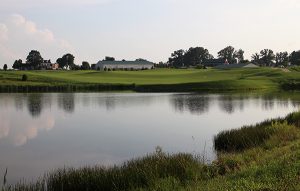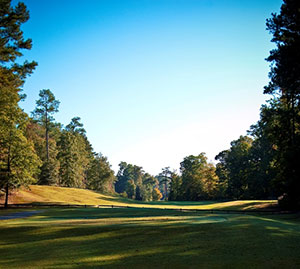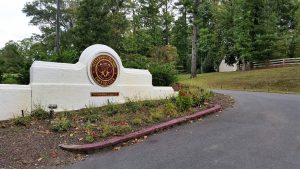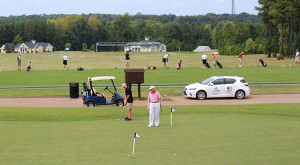“I’m fed up with summer.”
So says Mike Hatch, the owner and general manager of Birkdale Golf Club and Brandermill Country Club, relaying what seems to be the consensus among his fellow local golf course operators in recent weeks.
This week’s 90-degrees-plus temperatures and ample humidity continued to give Hatch and his peers extra reason to sweat in what has been an endless summer for an industry that lives and dies with the weather.
Not only did the extended steamy blanket that hovered over Richmond for much of the last two months make it tough to convince golfers to come out play a round under the sun, it also put the grounds of many local golf courses at risk, particularly for damage to their greens.
The heat, humidity and few, but fast moving summer rain storms have forced more than a handful of area courses to take measures both drastic and creative over the last several weeks to prevent damage on greens that are still healthy and to minimize it on those that have been hard hit.
Their tactics have included minimizing foot traffic by limiting play, shutting down individual holes and in some cases shutting entire courses down for days at a time to give the turf a breather.
“It’s just one of those summers that you have to try to get through,” said Jimmy Gable, superintendent at Jefferson Lakeside Country Club, near the botanical gardens in Henrico County.
Gable and Jefferson Lakeside general manager Bob Foster have had to make tough calls in recent weeks as a precautionary measure to keep the course in good shape. The club has fared better than many of its local competitors, some of which are still dealing with damage to their greens.
Jefferson Lakeside limited tee times during the hottest parts of the day in late August. That included limiting hours over Labor Day weekend, which is usually a busy golfing time. It gave Gabel and his crews time to hand water the greens and give the precious turf time to cool off and rest.
“The part that people don’t really think about is the amount of stress that foot traffic puts on greens,” Foster said.
Foster cited nearly 40 days of sustained daytime temperatures over 90 degrees, which he said is unusual, even for Richmond.
But perhaps more worrisome were recent night time temperatures that some evenings didn’t dip below the 80s – the days, Foster said, “When you wake up and its 89 degrees at 6 in the morning.”
“Bent grass, which is what almost all of us have on our greens, doesn’t get a chance to recuperate if it doesn’t get a chance to cool down,” Foster said.
Gabel and his crew got creative, doing maintenance by hand, rather than bringing heavy equipment out on the course, and raising the height of grass in certain areas.
“I’ve been a superintendent for over 10 years managing bent grass in the Deep South in Atlanta,” Gabel said. “This is kind of normal to me. You build a strong plant and prepare for the absolute worst and hope for the best.”
Across the river, Willow Oaks Country Club restricted play for a couple weeks last month to help heal some of its greens and maintain the health of others.
Willow Oaks General Manager Chris Welles said a few of the club’s greens were hit hard by the heat.
“Like a number of courses in town we struggled with a tough bout of heat stress,” he said. “The worst was about a month ago.

The Federal Club in Glen Allen restricted play at points in recent weeks, as well as several other courses.
“We restricted traffic for two weeks completely and then reduced it by closing some of the holes.”
Willow Oaks, which is now back open for full play as usual, wasn’t alone in making such a move. The Federal Club in Glen Allen, the Dominion Club and Salisbury Country Club in Midlothian all restricted play at points in recent weeks.
Chris Gilman, owner of the Federal Club, said his course shut down completely for nine days in August, but reopened fully at the end of the month. The closure allowed his crew to aerate and condition the course and let it rest.
Officials at Dominion Club and Salisbury couldn’t be reached for comment.
The decisions show the balance that course keepers have to juggle to keep members happy. It’s a fine line between maintaining a healthy course and being open for members to play when they want to play.
Clubs like Willow Oaks and Jefferson Lakeside have sent out regular detailed explanations about the conditions and explaining their decisions and strategies.
“The response has been overwhelmingly positive,” Foster said of his members. “They understand the decisions we’ve made are in the best interest of the course.”
Mike Hatch said this summer has been noteworthy because the conditions have affected both high-end private courses and lower end public courses.
“I’ve lost greens many times (in past years) when it gets extremely hot because my budgets are lean and mean,” Hatch said of his mid-tier clubs. “This year what surprised everyone is it has hit the high-end courses.”
He said the few strong rain storms that swept quickly through the area this summer added fuel to the risks caused by the heat.
“It’s not always the heat. It’s the rain that does the most damage,” Hatch said. “Those heavy storms when it was 100-plus degrees just wiped out so many golf courses.”
Hatch said overheated greens that get dumped on by heavy rains aren’t always able to absorb all the water, particularly at courses where members like their greens cut short for speed. The rain either runs off or can pool up.
“There’s so much pressure for fast greens,” Hatch said. “So the superintendent has to mow them short, but when it rains the water has nowhere to go.”
In defense of those that have charred greens this season, Hatch said the damage can happen in a matter of hours.
“I’ve never seen Brandermill and Birkdale as good. That could all change tomorrow,” Hatch said.
Perhaps the only local course owner who’s not cursing the summer is Giff Breed. He owns Independence Golf Club in Midlothian, the only course in the Richmond market that has champion Bermuda grass on its greens, which can withstand the heat.
“Giff has picked up quite a bit of play,” from some of the harder hit courses, Hatch said.
Breed said on a recent Saturday during the heatwave Independence had a packed tee sheet of 170 golfers.
“It’s because of this champion Bermuda grass,” Breed said. “The flip side is in the winter we have to put blankets on all the greens if it gets below 25 degrees. Our bet was that a lot less people will play when it’s cold.”
Carl Filipowicz is tasked with managing three courses in the eastern part of the Richmond region: Brickshire, StoneHouse and Royal New Kent golf clubs.
He said he didn’t have to shut down any holes, but did see some damage to a few greens at Stone House and Royal New Kent.
And while slightly cooler temperatures are expected in the latter part of this week, Filipowicz said courses aren’t out of the woods yet.
He said these recent conditions are hardest on superintendents, who in today’s golf industry have to work with tight budgets and often without a lot of manpower.
“For superintendents this time of year, some of them are working seven days a week, early in the morning and late at night.” Filipowicz said. “I just try to stay out of their way and keep them happy.”
“I’m fed up with summer.”
So says Mike Hatch, the owner and general manager of Birkdale Golf Club and Brandermill Country Club, relaying what seems to be the consensus among his fellow local golf course operators in recent weeks.
This week’s 90-degrees-plus temperatures and ample humidity continued to give Hatch and his peers extra reason to sweat in what has been an endless summer for an industry that lives and dies with the weather.
Not only did the extended steamy blanket that hovered over Richmond for much of the last two months make it tough to convince golfers to come out play a round under the sun, it also put the grounds of many local golf courses at risk, particularly for damage to their greens.
The heat, humidity and few, but fast moving summer rain storms have forced more than a handful of area courses to take measures both drastic and creative over the last several weeks to prevent damage on greens that are still healthy and to minimize it on those that have been hard hit.
Their tactics have included minimizing foot traffic by limiting play, shutting down individual holes and in some cases shutting entire courses down for days at a time to give the turf a breather.
“It’s just one of those summers that you have to try to get through,” said Jimmy Gable, superintendent at Jefferson Lakeside Country Club, near the botanical gardens in Henrico County.
Gable and Jefferson Lakeside general manager Bob Foster have had to make tough calls in recent weeks as a precautionary measure to keep the course in good shape. The club has fared better than many of its local competitors, some of which are still dealing with damage to their greens.
Jefferson Lakeside limited tee times during the hottest parts of the day in late August. That included limiting hours over Labor Day weekend, which is usually a busy golfing time. It gave Gabel and his crews time to hand water the greens and give the precious turf time to cool off and rest.
“The part that people don’t really think about is the amount of stress that foot traffic puts on greens,” Foster said.
Foster cited nearly 40 days of sustained daytime temperatures over 90 degrees, which he said is unusual, even for Richmond.
But perhaps more worrisome were recent night time temperatures that some evenings didn’t dip below the 80s – the days, Foster said, “When you wake up and its 89 degrees at 6 in the morning.”
“Bent grass, which is what almost all of us have on our greens, doesn’t get a chance to recuperate if it doesn’t get a chance to cool down,” Foster said.
Gabel and his crew got creative, doing maintenance by hand, rather than bringing heavy equipment out on the course, and raising the height of grass in certain areas.
“I’ve been a superintendent for over 10 years managing bent grass in the Deep South in Atlanta,” Gabel said. “This is kind of normal to me. You build a strong plant and prepare for the absolute worst and hope for the best.”
Across the river, Willow Oaks Country Club restricted play for a couple weeks last month to help heal some of its greens and maintain the health of others.
Willow Oaks General Manager Chris Welles said a few of the club’s greens were hit hard by the heat.
“Like a number of courses in town we struggled with a tough bout of heat stress,” he said. “The worst was about a month ago.

The Federal Club in Glen Allen restricted play at points in recent weeks, as well as several other courses.
“We restricted traffic for two weeks completely and then reduced it by closing some of the holes.”
Willow Oaks, which is now back open for full play as usual, wasn’t alone in making such a move. The Federal Club in Glen Allen, the Dominion Club and Salisbury Country Club in Midlothian all restricted play at points in recent weeks.
Chris Gilman, owner of the Federal Club, said his course shut down completely for nine days in August, but reopened fully at the end of the month. The closure allowed his crew to aerate and condition the course and let it rest.
Officials at Dominion Club and Salisbury couldn’t be reached for comment.
The decisions show the balance that course keepers have to juggle to keep members happy. It’s a fine line between maintaining a healthy course and being open for members to play when they want to play.
Clubs like Willow Oaks and Jefferson Lakeside have sent out regular detailed explanations about the conditions and explaining their decisions and strategies.
“The response has been overwhelmingly positive,” Foster said of his members. “They understand the decisions we’ve made are in the best interest of the course.”
Mike Hatch said this summer has been noteworthy because the conditions have affected both high-end private courses and lower end public courses.
“I’ve lost greens many times (in past years) when it gets extremely hot because my budgets are lean and mean,” Hatch said of his mid-tier clubs. “This year what surprised everyone is it has hit the high-end courses.”
He said the few strong rain storms that swept quickly through the area this summer added fuel to the risks caused by the heat.
“It’s not always the heat. It’s the rain that does the most damage,” Hatch said. “Those heavy storms when it was 100-plus degrees just wiped out so many golf courses.”
Hatch said overheated greens that get dumped on by heavy rains aren’t always able to absorb all the water, particularly at courses where members like their greens cut short for speed. The rain either runs off or can pool up.
“There’s so much pressure for fast greens,” Hatch said. “So the superintendent has to mow them short, but when it rains the water has nowhere to go.”
In defense of those that have charred greens this season, Hatch said the damage can happen in a matter of hours.
“I’ve never seen Brandermill and Birkdale as good. That could all change tomorrow,” Hatch said.
Perhaps the only local course owner who’s not cursing the summer is Giff Breed. He owns Independence Golf Club in Midlothian, the only course in the Richmond market that has champion Bermuda grass on its greens, which can withstand the heat.
“Giff has picked up quite a bit of play,” from some of the harder hit courses, Hatch said.
Breed said on a recent Saturday during the heatwave Independence had a packed tee sheet of 170 golfers.
“It’s because of this champion Bermuda grass,” Breed said. “The flip side is in the winter we have to put blankets on all the greens if it gets below 25 degrees. Our bet was that a lot less people will play when it’s cold.”
Carl Filipowicz is tasked with managing three courses in the eastern part of the Richmond region: Brickshire, StoneHouse and Royal New Kent golf clubs.
He said he didn’t have to shut down any holes, but did see some damage to a few greens at Stone House and Royal New Kent.
And while slightly cooler temperatures are expected in the latter part of this week, Filipowicz said courses aren’t out of the woods yet.
He said these recent conditions are hardest on superintendents, who in today’s golf industry have to work with tight budgets and often without a lot of manpower.
“For superintendents this time of year, some of them are working seven days a week, early in the morning and late at night.” Filipowicz said. “I just try to stay out of their way and keep them happy.”






Not good considering some golf courses in the area are struggling these days. Maybe more will look into investing in Bermuda grasses and see if it’s a more viable option, especially if it plays well during the warmer months when more people are willing to play a round.
I have been a Superintendent for 30 years and have never experienced such grass loss in a short period of time. I believe we all including managers have to look at each course micro climate conditions and make a sound call to see which grass better suits the location and pass it on to the owners and members and make that call no matter how old the greens are. As I see it the weather conditions of summer are heating up more.Trying to grow a turf that was developed in a cooler climate in an environment that’s not native to… Read more »
This caught my eye: ““There’s so much pressure for fast greens,” Hatch said. “So the superintendent has to mow them short, but when it rains the water has nowhere to go.” I heard the same earlier this week while playing at a higher end private club with significant green damage. At some point superintendents have to be empowered to push back and inform the membership healthy and (temporarily) slow is better than fast and badly damaged. And the greens committee has to back that decision loudly and publicly. I golf at Meadowbrook, and our greens are showing strain like everyone… Read more »